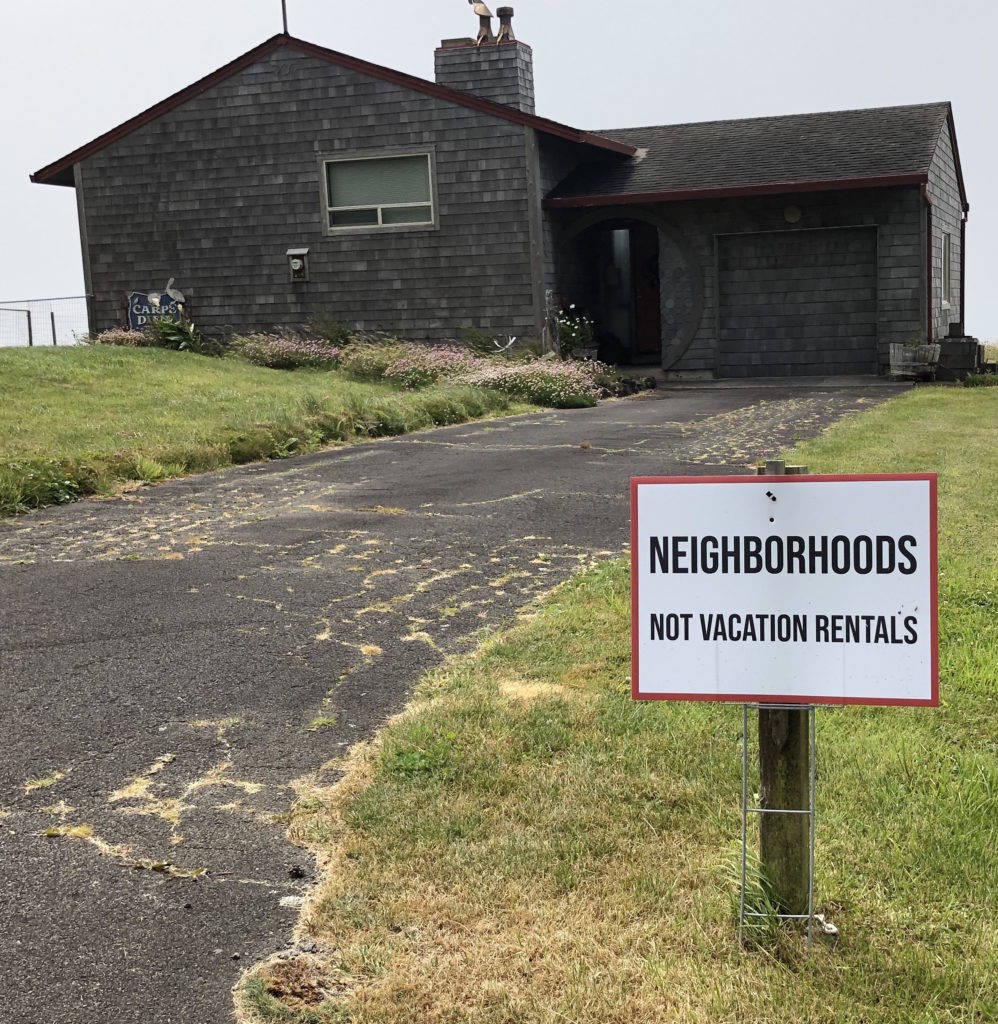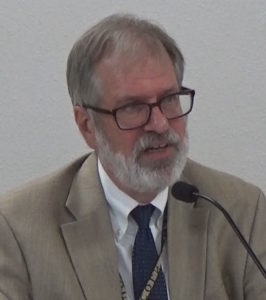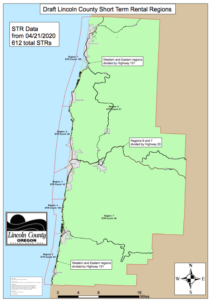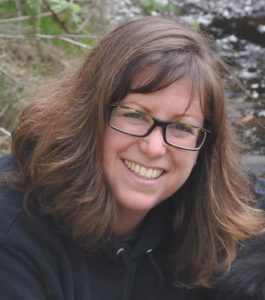
By QUINTON SMITH/YachatsNews.com
Lincoln County staff has unveiled proposals for tighter regulations on vacation rentals in unincorporated areas, suggesting much lower occupancy limits, setting up a hearings process for complaints, and floating an idea to limit rentals by geographic area that could replace a countywide cap.
County commissioners got a first look at the proposals Monday from counsel Wayne Belmont, but without much notice – one hour — to react or ask detailed questions.
The county has scheduled a 3-hour workshop for 6 p.m. Wednesday, April 7 to explain the proposals to the public and take comments.

Belmont said he hopes commissioners can begin a deeper discussion at its April 12 meeting and finish work by the commission’s self-imposed June 1 deadline. The county has extended a moratorium on new licenses in unincorporated areas three times in the past year and hopes not to have to do that again.
Two of Belmont’s proposals – occupancy limits and septic regulations — come as little surprise as they have been in play for at least a year. But the hearings process and regulating rentals by zone or geographic area are new – and more complicated.
“I found this to be the most interesting,” Belmont said of code enforcement and hearings. “It’s a simpler way to handle complaints …”
A countywide limit on vacation rental licenses was always going to be the most contentious issue. There are 566 licenses now, and many residents of rural subdivisions near the beach are complaining about too many short-term rentals in their single-family neighborhoods.
Belmont said one possible way to appease neighborhoods would be to create seven geographic zones and establish rental limits – there was no suggestion how Monday – in each of those zones. Five of the zones run along the beach, west of U.S. Highway 101, between cities from Yachats in the south to Lincoln City in the north. Two much larger zones are areas east of U.S. 101 and north or south of Oregon Highway 20.
“It’s a more complicated process,” Belmont told commissioners, “but allows you to reduce STRs in some areas.”

The proposed zones in unincorporated areas are:
- Zone 5: From the north city limits of Yachats to the city of Waldport, which currently has 94 licensed rentals;
- Zone 4: From the Bayshore community north of Waldport to Beaver Creek north of Seal Rock, which currently has 163 rentals;
- Zone 3: From Beaver Creek to the south edge of Newport, with 43 rentals;
- Zone 2: From the north edge of Newport to the south limits of Depoe Bay, which 26 rentals;
- Zone 1: From Depoe Bay to Lincoln City, with 195 rentals;
- Zone 6: All the unincorporated county east of U.S. 101 from Lincoln City in the north to Highway 20 in the south, with 51 rentals;
- Zone 7: All the unincorporated county east of U.S. 101 from Highway 20 in the north to the Lane County line in the south, with 40 rentals.
In answer to a question, Belmont said staff had not finished work on a formula or methodology for setting a license limit in each zone, but would present one to commissioners “and you can make a decision.”
The zoned approach to limiting licenses was just one of four Belmont presented to commissioners. He also said the board could:
- Not establish any cap;
- Create a cap – below, equal to, or greater than the current 612 — for licenses in unincorporated areas and establish a waiting list;
- Establish an overall license limit for the county and for each zone with a waiting list, and allow new licenses only when the cap in that zone is not exceeded;
- No countywide cap, but caps in each of the seven zones.
Of the final suggestion, Belmont said in a memo, “This could allow a variation of caps, allowing fewer than the number of existing rental licenses in some areas, but a greater number than currently exist in others. The individual sub-area (zone) caps could be periodically adjusted.”
All the cap proposals, Belmont said, would allow homes to be licensed as rentals until the property is sold or ownership transferred.
Belmont said the county has developed mapping and software tools to administer any limits in the seven proposed zones.
Hearings officer
The staff proposals also call for using a quasi-judicial administrative hearings process using a third party to hold hearings on complaints and possible violations. It would allow either a neighbor or the sheriff’s code enforcement deputy to file complaints.

Sheriff Curtis Landers admitted to commissioners that currently “there is not much code enforcement going on” because two specially-hired deputies can only currently cite infractions if they witness them. He endorsed Belmont’s proposal, saying “this is exactly the piece that has been missing.”
Under Belmont’s proposal, if the hearings officer determines there has been a violation of vacation rental rules, it would count as one “strike” toward a three-strike limit before the homeowner’s license is revoked.
Lower occupancy limits
County staff is also recommending a dramatic reduction in occupancy limits for vacation rentals.
Currently the county limits occupancy to three people per bedroom plus two additional people, meaning for example, that a three-bedroom house can have up to 11 people use it.
The staff’s proposal is to simply limit occupancy to two people per bedroom. So that three-bedroom house, for example, would have a limit of six guests.
Staff is also proposing the limit apply to daytime events – with an additional two people allowed until 10 p.m. — to prevent large gatherings such as weddings, graduations, and large parties from disrupting neighborhoods.
“These are residential areas and should be used for residential purposes,” Belmont told commissioners, adding that people wanting to hold large gatherings can find other places to do that.
The staff proposal would also require vacation rentals on septic tanks to have it evaluated for its condition and capacity, and repaired if necessary before its licensed is renewed. Belmont said the inspection would “establish a ceiling capacity on the number of persons who can occupy the property, no matter what is otherwise authorized under the code.”
The proposal would also require annual inspections for the next two years until the county can examine how the new requirements are working.
The reactions
One of two opposing groups — one that adamantly opposes caps and one that has pushed for a ban — and which have been testifying regularly on the county’s regulations weighed in on the proposals Wednesday.
“These proposals are brand new and it will take time to fully understand to what degree they might negatively impact local taxpayers,” said Jamie Michel, vice president of public policy for Sweet Homes Vacation Getaways and co-founder of VIA Oregon, a coalition of vacation rental managers and owners.

“We want to work with the county and create good rules that make sense,” Michel said. “The proposals are brand new and haven’t been shared until now, a week before the public hearing. We want fair regulations that work, but some of these proposals would only hurt local taxpayers and won’t achieve compliance which will result in driving the activity underground.”
A group of neighborhood associations called “15neighborhoods” that has been seeking signatures to put an initiative on the Lincoln County ballot that would ban short-term rentals had a steering committee meeting Monday night to discuss the county’s proposals. At one time the group hoped to get the initiative on the May ballot, but backed off to let the county develop its plan.
“We are pleased with the progress and are waiting to hear further discussions about cap proposals and what additional specific sub-area information we can provide,” the group said in an emailed statement. “We remain committed to pursuing remedies to restore and maintain residential neighborhood integrity, character and livability, to increase available housing for our working families, to support the environmental health and safety of Lincoln County residents, and to improve the enforcement of our codes and ordinances in unincorporated Lincoln County, in our residential neighborhoods.”



What a shame. The county is leaving itself completely open to lawsuits without addressing the issues that people are concerned about.